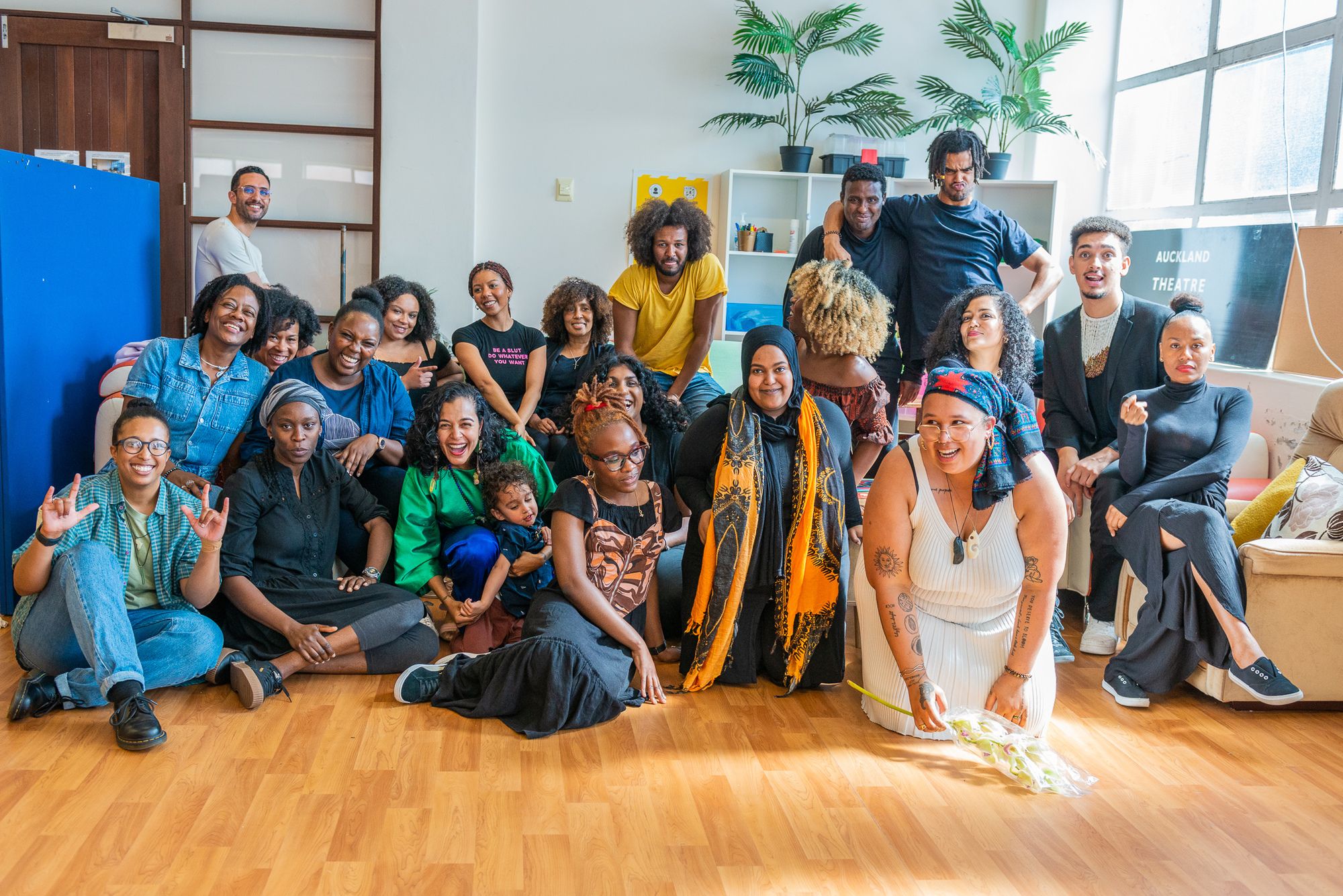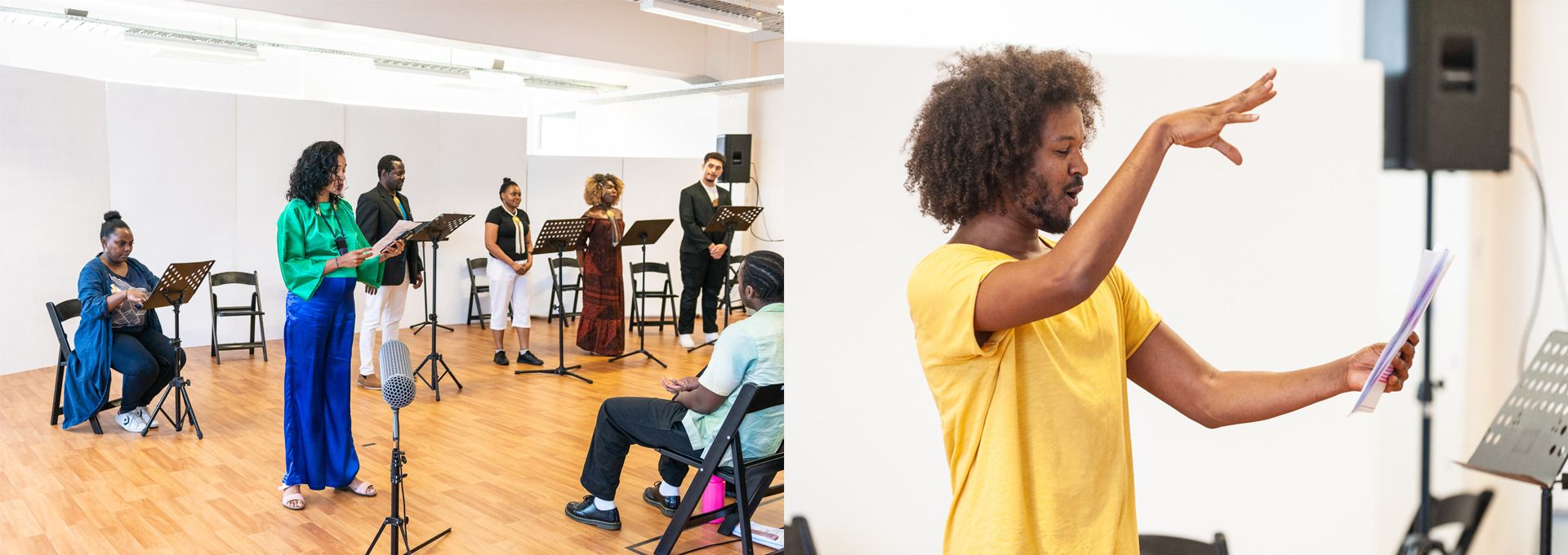Eight New Plays by Black Creatives
Vira Paky reports from the very first Playwrights’ Showcase by Black Creatives Aotearoa, featuring eight new plays written and performed by Black Diaspora creators.
Nothing can brighten up my Saturday afternoon quicker than some good ol’ theatre, which is how I found myself at Auckland Theatre Company for the Black Creatives Aotearoa Playwrights’ Showcase a few weekends ago. Black Creatives Aotearoa (BCA) has co-ordinated a Playwrights Lab for the past four years, but this November marked the very first BCA Playwrights Showcase. The event presented an opportunity for any of the playwrights who had previously participated in the BCA Playwrights Lab to work with a Black director and Black actors to bring their words to life through a 30-minute play reading. This showcase was a collection of eight plays from eight different Black playwrights, with four Black directors and all Black actors, led by the team of Daisy Remington, Kauthar Eckstein, Marie Hidk and BCA founder Dione Joseph. Having had the opportunity not only to participate in the BCA Playwrights Lab earlier this year but also to produce in the past, I was unbelievably thrilled to see everyone’s creative work come to fruition.
L: Image from 'Time', R: Image from 'Nyara' Photo credit: Michael Loh
The first set of plays was Time (written by Keagan Carr Fransch) and Nyara (written by Kauthar Eckstein), directed by Lynnette Harris. These two plays dance with the concept of otherworldly Afrofuturism. In Time,we are in space with two Black Kiwi women, T113 and T114, in the year 2121 on a planet-cleaning expedition. Tensions rise in the close proximity and grow as more things start malfunctioning on the ship. If you’ve enjoyed Black Mirror’s San Junipero or just have a soft spot for the classic golden-retriever black-cat relationship (like me), this one is for you. In Nyara, we follow a young woman as she enters The Realm to investigate her mother’s suicide, which results in her dancing on the edge of dreams and reality. Nyara left me holding my breath, pulled by the emotional dialogue and the continuous twists and turns. Not for the faint of heart, but definitely for those with a strong will and passion for whānau.
L: Image from 'Call Me Rosalie', R: Image from 'Of Ghosts and Men' Photo credit: Michael Loh
The second set of plays was Call Me Rosalie (written by Ayobami Beckley Adesanya) and Of Ghosts and Men (written by Alex de Vries); directed by actor and first-time director Keven Souza, these two plays could not be more dramatically juxtaposed to each other. In Call Me Rosalie, we are welcomed into the past of a young Nigerian woman, Idera (later renamed Rosalie), whose town had been raided and who was subsequently sold into slavery. We follow her from Nigeria to a Portuguese sugarcane plantation, as she tries to find herself again through her physical, emotional and sexual trauma in this unfamiliar land. Dark, and for those interested in authentic personal narratives lost in traumatic histories of slavery, this remarkable story will tug at the heartstrings and ancestral ties. In Of Ghosts and Men, we laugh alongside a young Queer travel agent as he spends his time booking romantic holidays for everyone except himself. He rants about absolute Karens while dealing with the solemn reality of being ghosted. It’s a contemporary one-man comedy that gives the audience a chance to lament the perils of dating apps with jokes that make you laugh because you don’t want to cry.If you’ve ever been on Tinder, Bumble, Grindr, OkCupid or Hinge, this is a lighthearted must-watch as a fun reminder that everyone else is suffering in dating, too.
L: Image from 'Gondwanaland', R: Image from 'The River Queen' Photo credit: Michael Loh
The third set of plays was Gondwanaland (written by Tawanda) and The River Queen (written by Estelle Chout), both directed by Alvie McCree. In Gondwanaland we are dropped into a work that embraces the cadence of spoken-word performance, layered with the emotional dialogue of a traditional drama. The chorus of actors’ voices, almost melodic in tone, will entrance and lull any audience into a calm. Gondwanaland is about a family torn by sacrifice, loss and love. It is a difficult tale, in stark contrast to the previous set of plays, so take a breath before cracking into this one. This story is recommended for those who can welcome thoughts on family, death and loss, and enjoy dramatic poetry.In The River Queen we return to an otherworldly landscape. We meet Saint Pita (Saint Peter) and Marsha P. Johnson, self-identified drag queen and iconic gay liberation activist, discussing her final moments in purgatory. Marsha P. Johnson comes to life through powerful monologues of sex and power, while grounded in her conviction and pride in the life she led. For anyone who daydreams about which historical figures they would like to invite to dinner and what they would say to them, this is a bit of you.
L: Image from 'Black Māori Girl', R: Image from 'When We Marched' Photo credit: Michael Loh
The final set of plays was Black Māori Girl (written by Alvie McCree) and When We Marched (written by Dione Joseph), directed by Sandra Zvenyika. The showcase ended with two delightfully evocative plays that explore the internal crises between being Kiwi and being Black. Black Māori Girl is the 1980s coming-of-age story of Marleen, struggling with her kinky hair and mixed-race identity. When she enters an African hair salon for the first time, Marleen gets to see her own skin, hair and nostrils reflected back at her, taking her back to a home she’s never known but one she needed. If you are a person of colour who grew up in the 70s or 80s, or grew up in rural New Zealand, you are entitled to financial compensation and you deserve to cry in joy with Marleen. When We Marched takes place in the wake of the murder of George Floyd and the fierce rising of the #BlackLivesMatter movement in New Zealand. This play follows the journey of the #BlackLivesMatter march during the Alert Level 3 Lockdown. When We Marched explores the need for Black New Zealanders to tell our own stories, and restate our existence in this country. It is also rooted in the need to be vulnerable in the wake of the tragedy, to lean on each other and to take action. It is a quintessential recommendation for anyone who gets a strong internal pull to contribute to social change, and gives a solid middle finger to white supremacy every day of the week.
The BCA Playwrights Showcase was an exceptional example of the diversity of Black Kiwi plays waiting for an audience in the New Zealand theatre scene.
The BCA Playwrights Showcase was an exceptional example of the diversity of Black Kiwi plays waiting for an audience in the New Zealand theatre scene. Each playwright not only includes Blackness and Black characters, but also the multiplicity of identities and experiences that interact with Blackness in unique, authentic ways. Choosing to walk towards the painfully specific in scripts like Time (written by Keagan Carr-Fransch), with two Queer Black Kiwi women in space at the forefront, the playwrights allow us to find the universal emotion – the joy, grief, fear or curiosity behind it all – and connect with their works.
Ultimately, the BCA Playwrights Showcase really gave everything that one could have asked for – the historical, the futuristic, the romantic, the comedic and the dramatic. And all for a small koha?! All this makes it all the more thrilling for what the landscape will look like for Black theatre and Black Creatives Aotearoa in 2023.
BCA Playwrights' Lab
7 – 12 November, 2022
Hosted at Auckland Theatre Company
More info about the programme can be found on their website.
Special thanks to the actors; Layla Pitt, Serena Mani, Jane Benney Kelly, Amina Farah, Genevieve Lenon, Fathe Tesfamariam, Tane Williams Accra, DK Verrian, Beatriz Karina Quinones, Mohamad Abdilah, Ladi Ajayi, Ashleigh Williams, Mukuka Musowa, and Chika Adeosun.





